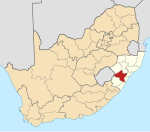Edendale, KwaZulu-Natal
Edendale | |
|---|---|
| Coordinates: 29°40′16″S 30°15′43″E / 29.671°S 30.262°E | |
| Country | South Africa |
| Province | KwaZulu-Natal |
| District | UMgungundlovu |
| Municipality | Msunduzi |
| Established | 1851 |
| Area | |
| • Total | 47.97 km2 (18.52 sq mi) |
| Population (2011)[1] | |
| • Total | 140,891 |
| • Density | 2,900/km2 (7,600/sq mi) |
| Racial makeup (2011) | |
| • Black African | 99.5% |
| • Coloured | 0.3% |
| • Indian/Asian | 0.1% |
| • White | 0.1% |
| • Other | 0.1% |
| First languages (2011) | |
| • Zulu | 91.0% |
| • Sotho | 4.6% |
| • English | 1.7% |
| • Xhosa | 1.5% |
| • Other | 3.2% |
| Time zone | UTC+2 (SAST) |
| Postal code (street) | 3201 |
| PO box | 3217 |
Edendale is a township in Msunduzi local municipality in the KwaZulu-Natal province of South Africa.
Edendale was established in 1851, when 100 black Christian families settled on the farm Welverdiend, about 10 km from Pietermaritzburg, and renamed it to its present name. The village was laid out under the guidance of James Allison, who had broken with the Wesleyan Missionary Society in 1851.[2]
Unlike most black urban areas, Edendale was developed under private land ownership from the beginning, a concept that was new to Africans in Natal. This Christian community abandoned traditional beliefs and practices, moving away from polygamy and introducing men to cultivation, previously the realm of women.[2]
Edendale retained its primarily Christian character into the 1920s, but by the 1940s people from rural areas began to pour in, leading to overcrowding and unsanitary conditions.
Edendale has become one of the most developing townships in Pietermaritzburg with amenities such as the Greater Edendale Mall, Colleges, and private schools just to name a few[2]
See also
[edit]- Edendale Technical High School
- Amakholwa Secondary
References
[edit]- ^ a b c d "Main Place Edendale". Census 2011.
- ^ a b c "Edendale, 1851-1930: farmers to townspeople, market to labour reserve". PMB Local History. Archived from the original on 24 October 2017. Retrieved 2 January 2014.
Bibliography
[edit]- Marc Epprecht (2016). Welcome to Greater Edendale: Histories of Environment, Health, and Gender in an African City. McGill-Queen's University Press. ISBN 978-0-7735-9966-6.



